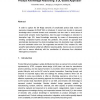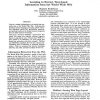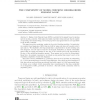381 search results - page 36 / 77 » Establishing Logical Rules from Empirical Data |
ACMICEC
2005
ACM
14 years 1 months ago
2005
ACM
In order to capture the full fledge semantic of complicated product data model, the expressive language ALCNHR+ K(D) is introduced. It cannot only be able to represent knowledge a...
SGAI
2007
Springer
14 years 1 months ago
2007
Springer
In this paper we describe a novel technique which implements a spatiotemporal model as a set of sub-models based on first order logic. These sub-models model different, typicall...
INFSOF
2007
13 years 7 months ago
2007
Due to the principal role of Data warehouses (DW) in making strategy decisions, data warehouse quality is crucial for organizations. Therefore, we should use methods, models, tech...
KDD
1997
ACM
13 years 11 months ago
1997
ACM
Thereis a wealthof informationto be minedfromnarrative text on the WorldWideWeb.Unfortunately, standard natural language processing (NLP)extraction techniques expect full, grammat...
LMCS
2007
13 years 7 months ago
2007
Higher-Order Fixpoint Logic (HFL) is a hybrid of the simply typed λ-calculus and the modal µ-calculus. This makes it a highly expressive temporal logic that is capable of express...



